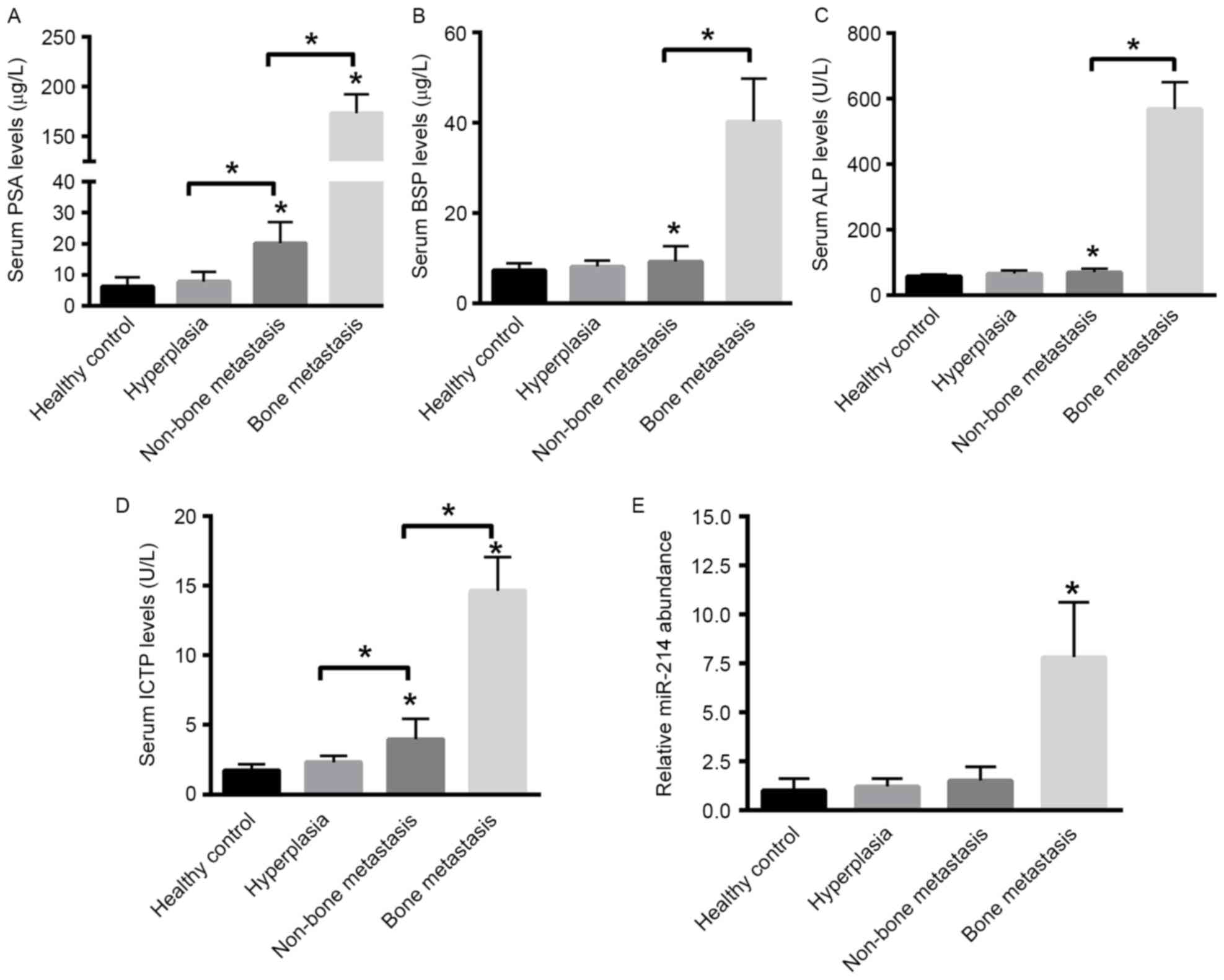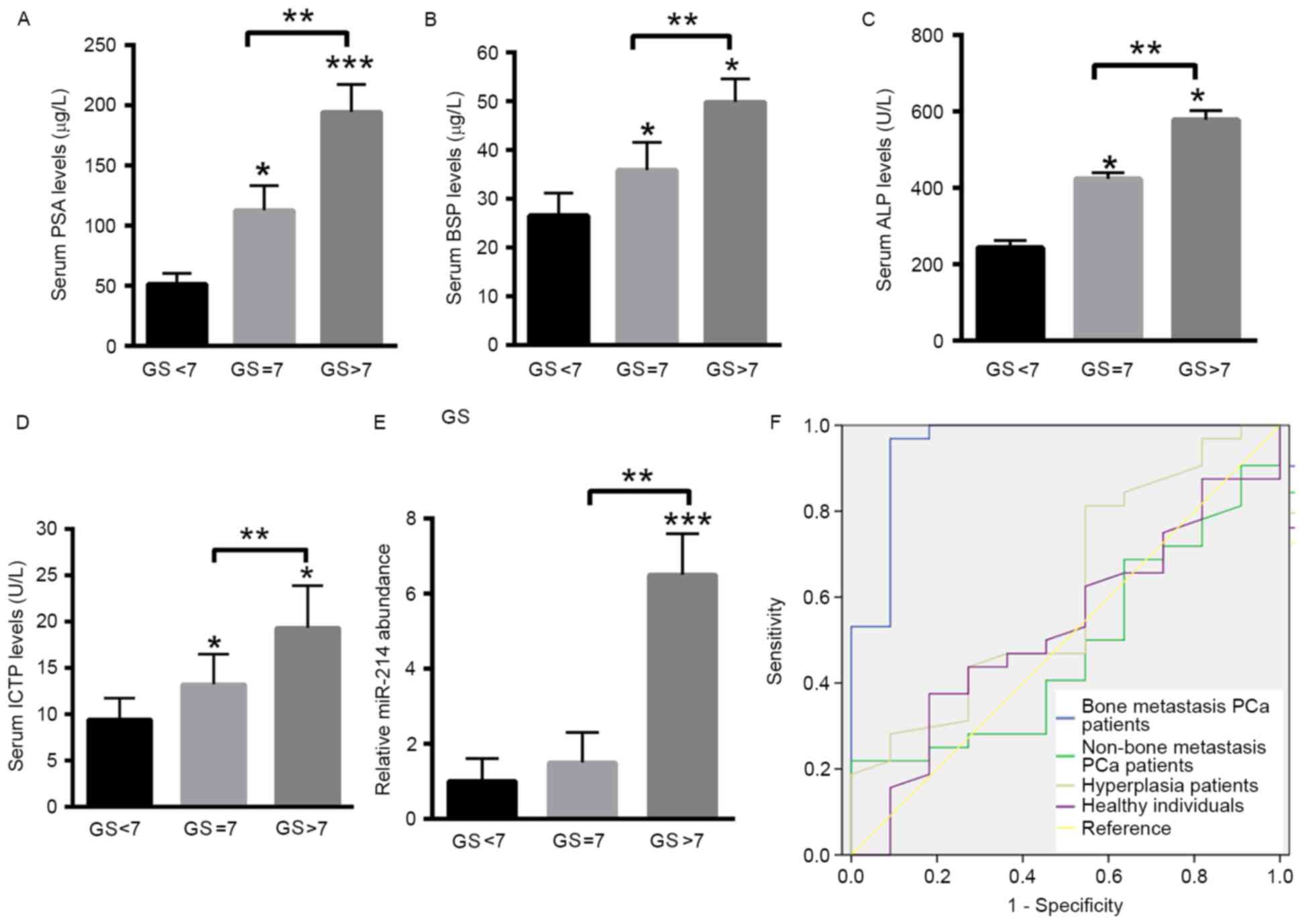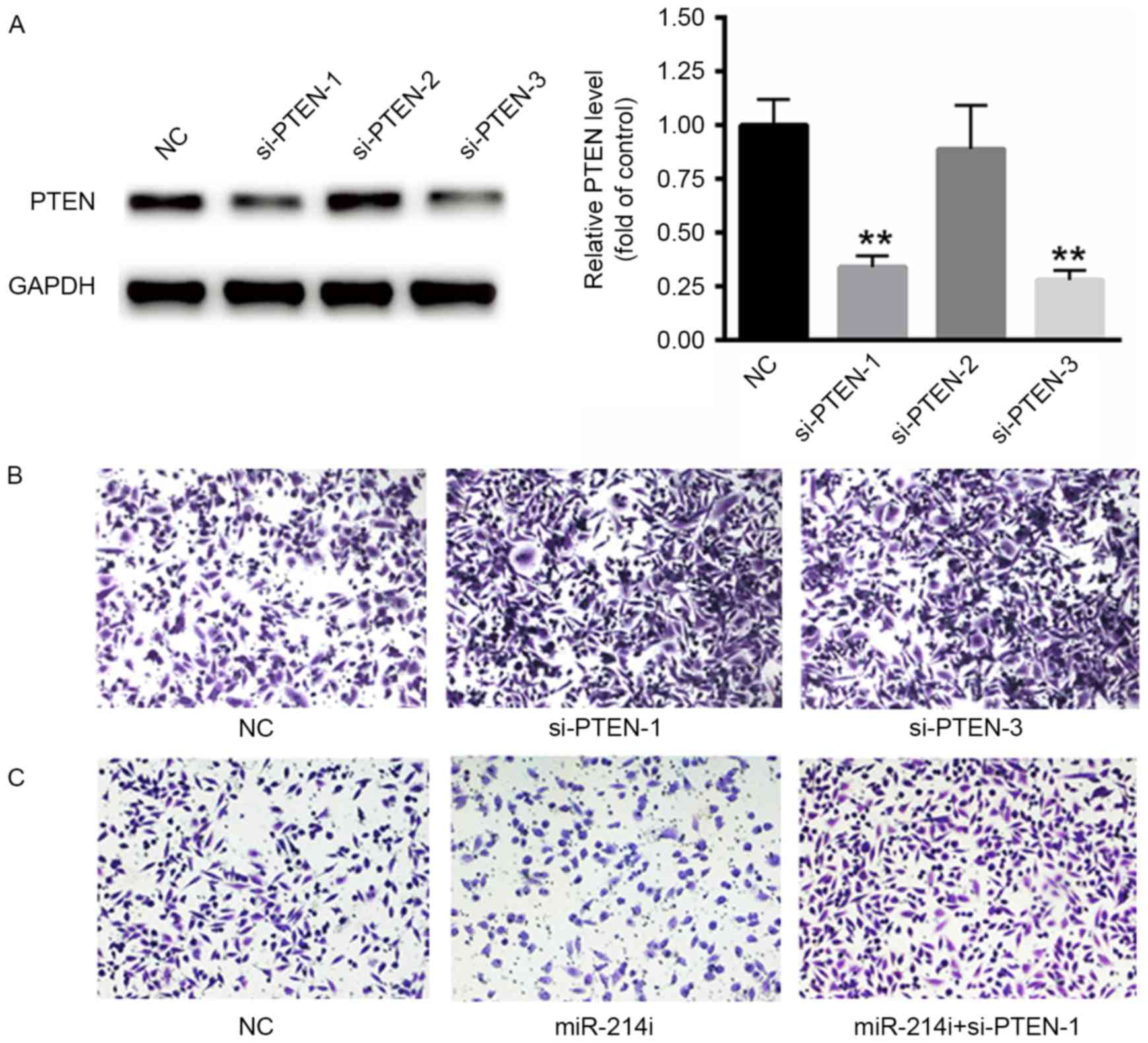|
1
|
Siegel RL, Miller KD and Jemal A: Cancer
statistics, 2015. CA Cancer J Clin. 65:5–29. 2015. View Article : Google Scholar : PubMed/NCBI
|
|
2
|
Siegel RL, Fedewa SA, Miller KD,
Goding-Sauer A, Pinheiro PS, Martinez-Tyson D and Jemal A: Cancer
statistics for Hispanics/Latinos, 2015. CA Cancer J Clin.
65:457–480. 2015. View Article : Google Scholar : PubMed/NCBI
|
|
3
|
Luna A, Vilanova JC and Alcalá Mata L:
Total body MRI in early detection of bone metastasis and its
indication in comparison to bone scan and other imaging techniques.
Arch Esp Urol. 68:371–390. 2015.(In Spanish). PubMed/NCBI
|
|
4
|
Ramankulov A, Lein M, Kristiansen G,
Loening SA and Jung K: Plasma osteopontin in comparison with bone
markers as indicator of bone metastasis and survival outcome in
patients with prostate cancer. Prostate. 67:330–340. 2007.
View Article : Google Scholar : PubMed/NCBI
|
|
5
|
Draisma G, Etzioni R, Tsodikov A, Mariotto
A, Wever E, Gulati R, Feuer E and de Koning H: Lead time and
overdiagnosis in prostate-specific antigen screening: Importance of
methods and context. J Natl Cancer Inst. 101:374–383. 2009.
View Article : Google Scholar : PubMed/NCBI
|
|
6
|
Kim EH and Andriole GL: Prostate-specific
antigen-based screening: Controversy and guidelines. BMC Med.
13:612015. View Article : Google Scholar : PubMed/NCBI
|
|
7
|
Kitagawa Y and Namiki M: Prostate-specific
antigen-based population screening for prostate cancer: Current
status in Japan and future perspective in Asia. Asian J Androl.
17:475–480. 2015.PubMed/NCBI
|
|
8
|
Kitajima K, Murphy RC, Nathan MA,
Froemming AT, Hagen CE, Takahashi N and Kawashima A: Detection of
recurrent prostate cancer after radical prostatectomy: Comparison
of 11C-choline PET/CT with pelvic multiparametric MR imaging with
endorectal coil. J Nucl Med. 55:223–232. 2014. View Article : Google Scholar : PubMed/NCBI
|
|
9
|
ChunJiao S, Huan C, ChaoYang X and GuoMei
R: Uncovering the roles of miRNAs and their relationship with
androgen receptor in prostate cancer. IUBMB Life. 66:379–386. 2014.
View Article : Google Scholar : PubMed/NCBI
|
|
10
|
Pekarik V, Gumulec J, Masarik M, Kizek R
and Adam V: Prostate cancer, miRNAs, metallothioneins and
resistance to cytostatic drugs. Curr Med Chem. 20:534–544. 2013.
View Article : Google Scholar : PubMed/NCBI
|
|
11
|
Stuopelytė K, Daniūnaitė K, Jankevičius F
and Jarmalaitė S: Detection of miRNAs in urine of prostate cancer
patients. Medicina (Kaunas). 52:116–124. 2016. View Article : Google Scholar : PubMed/NCBI
|
|
12
|
Sun T, McKay R, Lee GS and Kantoff P: The
role of miRNAs in prostate cancer. Eur Urol. 68:589–590. 2015.
View Article : Google Scholar : PubMed/NCBI
|
|
13
|
Chang YS, Chen WY, Yin JJ,
Sheppard-Tillman H, Huang J and Liu YN: EGF receptor promotes
prostate cancer bone metastasis by downregulating miR-1 and
activating TWIST1. Cancer Res. 75:3077–3086. 2015. View Article : Google Scholar : PubMed/NCBI
|
|
14
|
Chen WY, Liu SY, Chang YS, Yin JJ, Yeh HL,
Mouhieddine TH, Hadadeh O, Abou-Kheir W and Liu YN: MicroRNA-34a
regulates WNT/TCF7 signaling and inhibits bone metastasis in
Ras-activated prostate cancer. Oncotarget. 6:441–457.
2015.PubMed/NCBI
|
|
15
|
Xin R, Bai F, Feng Y, Jiu M, Liu X, Bai F,
Nie Y and Fan D: MicroRNA-214 promotes peritoneal metastasis
through regulating PTEN negatively in gastric cancer. Clin Res
Hepatol Gastroenterol. 40:748–754. 2016. View Article : Google Scholar : PubMed/NCBI
|
|
16
|
Kuninty PR, Bojmar L, Tjomsland V, Larsson
M, Storm G, Östman A, Sandström P and Prakash J: MicroRNA-199a and
−214 as potential therapeutic targets in pancreatic stellate cells
in pancreatic tumor. Oncotarget. 7:16396–16408. 2016. View Article : Google Scholar : PubMed/NCBI
|
|
17
|
Das F, Dey N, Bera A, Kasinath BS,
Ghosh-Choudhury N and Choudhury GG: MicroRNA-214 reduces
insulin-like growth factor-1 (IGF-1) receptor expression and
downstream mTORC1 signaling in renal carcinoma cells. J Biol Chem.
291:14662–14676. 2016. View Article : Google Scholar : PubMed/NCBI
|
|
18
|
Tang SL, Gao YL and and Chen XB:
MicroRNA-214 targets PCBP2 to suppress the proliferation and growth
of glioma cells. Int J Clin Exp Pathol. 8:12571–12576.
2015.PubMed/NCBI
|
|
19
|
Siemińska L, Borowski A, Marek B, Nowak M,
Kajdaniuk D, Warakomski J and Kos-Kudła B: Serum concentrations of
adipokines in men with prostate cancer and benign prostate
hyperplasia. Endokrynol Pol. Feb 21–2018.(Epub ahead of print).
|
|
20
|
Jansson UH, Kristiansson B, Magnusson P,
Larsson L, Albertsson-Wikland K and Bjarnason R: The decrease of
IGF-I, IGF-binding protein-3 and bone alkaline phosphatase isoforms
during gluten challenge correlates with small intestinal
inflammation in children with coeliac disease. Eur J Endocrinol.
144:417–423. 2001. View Article : Google Scholar : PubMed/NCBI
|
|
21
|
Ofori JK, Salunkhe VA, Bagge A, Vishnu N,
Nagao M, Mulder H, Wollheim CB, Eliasson L and Esguerra JL:
Elevated miR-130a/miR130b/miR-152 expression reduces intracellular
ATP levels in the pancreatic beta cell. Sci Rep. 7:449862017.
View Article : Google Scholar : PubMed/NCBI
|
|
22
|
Livak KJ and Schmittgen TD: Analysis of
relative gene expression data using real-time quantitative PCR and
the 2(-Delta Delta C(T)) method. Methods. 25:402–408. 2001.
View Article : Google Scholar : PubMed/NCBI
|
|
23
|
Zou ZJ, Fan L, Wang L, Xu J, Zhang R, Tian
T, Li JY and Xu W: miR-26a and miR-214 down-regulate expression of
the PTEN gene in chronic lymphocytic leukemia, but not PTEN
mutation or promoter methylation. Oncotarget. 6:1276–1285. 2015.
View Article : Google Scholar : PubMed/NCBI
|
|
24
|
Yang TS, Yang XH, Wang XD, Wang YL, Zhou B
and Song ZS: MiR-214 regulate gastric cancer cell proliferation,
migration and invasion by targeting PTEN. Cancer Cell Int.
13:682013. View Article : Google Scholar : PubMed/NCBI
|
|
25
|
Fujii T, Shimada K, Tatsumi Y, Fujimoto K
and Konishi N: Syndecan-1 responsive microRNA-126 and 149 regulate
cell proliferation in prostate cancer. Biochem Biophys Res Commun.
456:183–189. 2015. View Article : Google Scholar : PubMed/NCBI
|
|
26
|
Fu H, He HC, Han ZD, Wan YP, Luo HW, Huang
YQ, Cai C, Liang YX, Dai QS, Jiang FN and Zhong WD: MicroRNA-224
and its target CAMKK2 synergistically influence tumor progression
and patient prognosis in prostate cancer. Tumour Biol.
36:1983–1991. 2015. View Article : Google Scholar : PubMed/NCBI
|
|
27
|
Kloosterman WP and Plasterk RH: The
diverse functions of microRNAs in animal development and disease.
Dev Cell. 11:441–450. 2006. View Article : Google Scholar : PubMed/NCBI
|
|
28
|
Ha TY: MicroRNAs in human diseases: From
cancer to cardiovascular disease. Immune Netw. 11:135–154. 2011.
View Article : Google Scholar : PubMed/NCBI
|
|
29
|
Baranwal S and Alahari SK: miRNA control
of tumor cell invasion and metastasis. Int J Cancer. 126:1283–1290.
2010.PubMed/NCBI
|
|
30
|
Liu B, Tian Y, Li F, Zhao Z, Jiang X, Zhai
C, Han X and Zhang L: Tumor-suppressing roles of miR-214 and
miR-218 in breast cancer. Oncol Rep. 35:3178–3184. 2016. View Article : Google Scholar : PubMed/NCBI
|
|
31
|
Chen BF, Suen YK, Gu S, Li L and Chan WY:
A miR-199a/miR-214 self-regulatory network via PSMD10, TP53 and
DNMT1 in testicular germ cell tumor. Sci Rep. 4:64132014.
View Article : Google Scholar : PubMed/NCBI
|
|
32
|
Yin Y, Cai X, Chen X, Liang H, Zhang Y, Li
J, Wang Z, Chen X, Zhang W, Yokoyama S, et al: Tumor-secreted
miR-214 induces regulatory T cells: A major link between immune
evasion and tumor growth. Cell Res. 24:1164–1180. 2014. View Article : Google Scholar : PubMed/NCBI
|
|
33
|
Jindra PT, Bagley J, Godwin JG and
Iacomini J: Costimulation-dependent expression of microRNA-214
increases the ability of T cells to proliferate by targeting Pten.
J Immunol. 185:990–997. 2010. View Article : Google Scholar : PubMed/NCBI
|
|
34
|
Srivastava A, Goldberger H, Dimtchev A,
Ramalinga M, Chijioke J, Marian C, Oermann EK, Uhm S, Kim JS, Chen
LN, et al: MicroRNA profiling in prostate cancer-the diagnostic
potential of urinary miR-205 and miR-214. PLoS One. 8:e769942013.
View Article : Google Scholar : PubMed/NCBI
|
|
35
|
Kamiya N, Suzuki H, Yano M, Endo T, Takano
M, Komaru A, Kawamura K, Sekita N, Imamoto T and Ichikawa T:
Implications of serum bone turnover markers in prostate cancer
patients with bone metastasis. Urology. 75:1446–1451. 2010.
View Article : Google Scholar : PubMed/NCBI
|
|
36
|
Moslehi M, Cheki M, Salehi-Marzijarani M,
Amuchastegui T and Gholamrezanezhad A: Predictors of bone
metastasis in pre-treatment staging of asymptomatic treatment-naive
patients with prostate cancer. Rev Esp Med Nucl Imagen Mol.
32:286–289. 2013.PubMed/NCBI
|


















